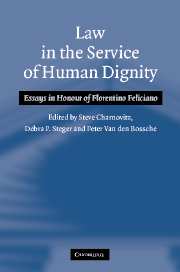Book contents
- Frontmatter
- Contents
- List of contributors
- Preface
- Biographical note
- List of abbreviations
- PART I Reflections on the contributions of Florentino Feliciano to international law
- 1 A judge's judge: Justice Florentino P. Feliciano's philosophy of the judicial function
- 2 The benign first mate
- 3 The Aristotelian
- 4 Trade and economic justice according to law
- PART II Insights into the World Trade Organization
- PART III The changing landscape of investment arbitration
- PART IV New challenges in international adjudication
- Bibliography of works by Florentino Feliciano
- Index
2 - The benign first mate
from PART I - Reflections on the contributions of Florentino Feliciano to international law
Published online by Cambridge University Press: 29 July 2009
- Frontmatter
- Contents
- List of contributors
- Preface
- Biographical note
- List of abbreviations
- PART I Reflections on the contributions of Florentino Feliciano to international law
- 1 A judge's judge: Justice Florentino P. Feliciano's philosophy of the judicial function
- 2 The benign first mate
- 3 The Aristotelian
- 4 Trade and economic justice according to law
- PART II Insights into the World Trade Organization
- PART III The changing landscape of investment arbitration
- PART IV New challenges in international adjudication
- Bibliography of works by Florentino Feliciano
- Index
Summary
Toy Feliciano's life in the law is a silent rebuttal to those who contend that a policy-oriented approach to law is but a façade for politics, that it is a tool for the powerful, and that it is in essence a front for the views of the State Department. As a member of the ‘invisible college’ of Yale Law School lawyers, he has throughout his life shown how this approach can be put to the service of values that are universal. His life and work also illustrate how those values can be promoted in full conformity with deep scholarship.
I first met Toy when I was a graduate student at Yale from 1959–61. He was already established there as a teacher and known to be collaborating with Myres McDougal in the preparation of Law and Minimum World Public Order. I was at that stage in my life where I had left the safe moorings of black-letter law and was being tossed about in the turbulent waters of policy science. Moreover, the captain of the ship on which I now found myself was at once magnificent and terrifying. Toy Feliciano seemed to me a sort of benign first mate, who certainly understood the course on which we were set and how we were to get there, but who might still be talked to in the ‘language of the old country’. My enduring memory of him in those early Yale years was of a person who was gentle, kind, and thoroughly competent.
- Type
- Chapter
- Information
- Law in the Service of Human DignityEssays in Honour of Florentino Feliciano, pp. 11 - 13Publisher: Cambridge University PressPrint publication year: 2005



